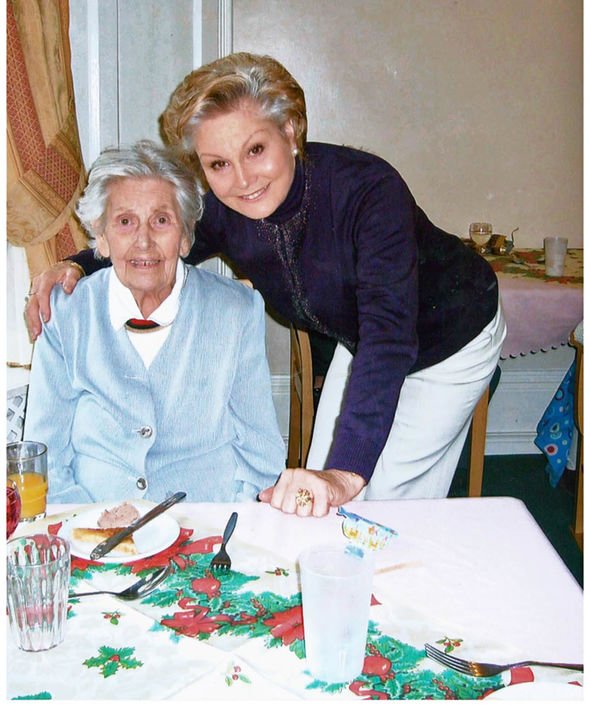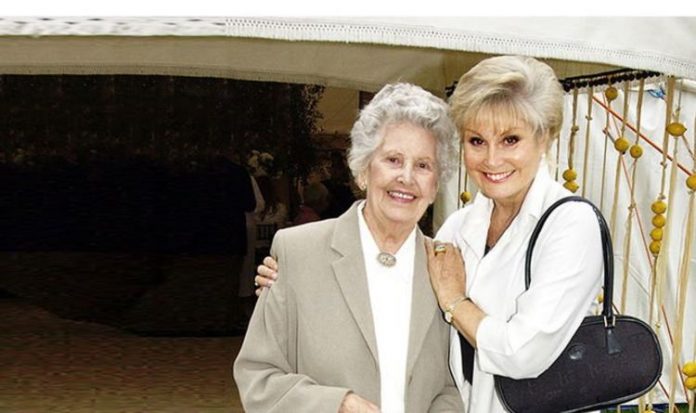
TV presenter Angela with Edna at an event in 2004 (Image: Getty)
Angela, 76, said it was such a relief that her own mother, who died of dementia, was spared the agonies of the past year. She said: “I am so grateful my mother is not in a care home now. She lived to a great age and I am glad I am not having to face this situation myself – but that makes me all the more sensitive to the great many people who are.”
Angela, an Alzheimer’s Society ambassador, added: “We must not forget the impact this situation is having on families, the agony and stress of knowing they have no access and no end in sight.
“Every day they are unable to see them is one in which that loved one deteriorates just a little bit more in a way they would not have done had there been access.
“My message to the Government is loud, clear and unequivocal: Sort it out. And do it now.”
She said those in care homes “are also dying of broken hearts”.
Like millions of family carers, Angela was devastated when she could no longer look after her mother, Edna, after she was struck down with the cruel disease.
Before her illness, Edna had enjoyed a long and happy marriage to John, a former marine who died suddenly from a heart attack a year before she was diagnosed.

Angela and her widowed mother Edna in 2008 when Edna’s dementia had advanced (Image: )
The shock of his death resulted in Edna suffering several mini-strokes which Angela believes triggered vascular dementia, the second most common form after Alzheimer’s, caused by restricted blood flow to the brain.
For four years after her diagnosis in 2004, Angela looked after her mother at home with help from live-in professionals.
But for the last year before her death at 82 in 2009, she was admitted to a care home where Angela was able to visit regularly.
She said: “I know what it is like to be a carer for someone in a home with dementia. I know the agony and the stress this places on them, knowing you cannot be with them 24/7, along with that feeling of guilt that you cannot look after them yourself, something everyone goes through.
“I can only imagine what families are feeling, knowing they have entrusted a loved one to a care home.
“For the majority, that means they are safe, but Covid-19 has moved the goalposts. So no matter how wonderful the home is, how caring the staff are, loved ones are deteriorating before our eyes and the pandemic is responsible for families having no meaningful contact.
“Seeing someone you love through a piece of glass or plastic just isn’t enough.
“None of us can get inside the head of someone with dementia but we absolutely know how they feel – that they have been abandoned by those they love and who loved them. They shouldn’t be dying before their time.”
Blanket bans on care home visits has denied many families the chance to say a final goodbye to more than 30,000 residents who have perished with coronavirus since the pandemic started.
Angela said: “When I went to see my mother I could hold her hand, hug her and do her hair. When it was her birthday we held a party and friends were always able to visit on a regular basis.To the very end she knew who I was.
“Even though she was often in a parallel universe at least it meant I could be with her, join her in that universe and talk to her.
“I can’t imagine what would have happened if for a whole year I was only allowed to see her occasionally through a plastic partition and from two metres away.
“She would have withered without that physical contact and mental stimulation – and not being able to understand why.”
Angela’s call is the latest attempt at ending the access scandal.
As this newspaper exclusively revealed earlier this month, the Joint Committee on Human Rights – a powerful select committee of MPs and Lords – has presented Health Secretary Matt Hancock with draft emergency legislation.
It would see families being designated as essential carers, guaranteeing them access. Meanwhile, in a separate move,
Age UK, John’s Campaign, the National Care Forum, Rights for Residents and the Relatives & Residents Association all said care home visits must be in place for residents and essential caregivers by March 1 as a first step to fully opening up.
Kate Lee, the chief executive of Alzheimer’s Society, said: “At least 70 percent of care home residents have dementia and, devastatingly, those living with the condition have been worst hit by the pandemic.
“Over the past year we’ve continually said the longer people with dementia go without meaningful contact from loved ones, the more they deteriorate.
“People are reaching out to us daily to say they have seen their relatives permanently losing their independence, the ability to feed themselves, and even their ability to speak.
“The return of indoor, close-contact visiting is essential for people with dementia and they simply cannot wait any longer.
“We need the Government to address this and set out a clear timetable and process to re-introduce meaningful visits to care homes, balancing the risk of spreading the virus with the need for contact.
“Without this clear guidance, families across the country are being left in a permanent state of worry and anxiety with no end in sight, and people with dementia are fading away day by day. This just cannot be allowed to continue.”
A Government source said: “We know visits to care homes are crucial and we have taken action during the restrictions with mitigations including visiting pods and substantial screens. The Government will do everything possible to make close contact visits possible when safe to do so.”
Comment by Helen Whately
We’ve rightly made care workers a priority for the vaccine rollout, and that includes those who care for people in their own homes.
Home care workers are doing an incredible job supporting some of the people most at risk from catching this virus.
They are often having to make huge personal sacrifices to keep the people they are looking after safe.
We’re determined all care workers have the chance to get vaccinated this month.
Vaccines offer the best protection from Covid and it is now even easier to book one – with care workers able to visit the NHS national booking system to book themselves in. This builds on the excellent work from care agencies like Abbots Care.
This company operating in the South-east has been doing everything it can to make sure its workforce take up the jab when it’s offered.
I encourage any care worker who has not yet been vaccinated to visit NHS online and book a vaccination.
It’s a vital protection for them and the people they care for.
Helen Whately is Minister of State for Social Care.







